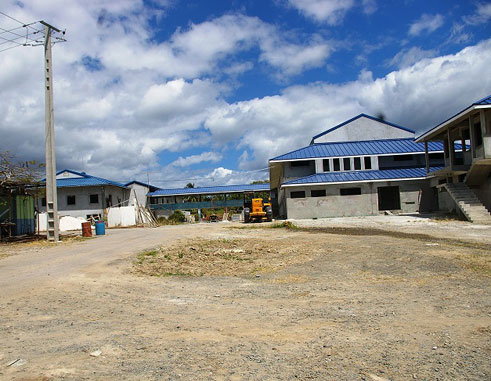
“BE wary of anyone who professes to be a seeker of truth and the pursuit of such truth by others becomes a casus belli – an act that justifies a war or conflict.’’ [John A. Peters]
The St. Jude Hospital Project is probably the largest project ever to be fully procured by Direct Award in the history of Saint Lucia and this preferred method of procurement continued with the appointment of the Consultant for the Technical Audit. Successive governments seem to have a proclivity for sole selective tendering processes for some ‘unimaginable’ reason.
In Part 3, I want to look specifically at the role and performance of the Consultant – Halcrow Group Ltd. — who was appointed by direct award by then Minister for Finance, Stephenson King. The Consultant played a very significant part on the project as outlined by the Terms of Reference of the engagement.
King, in his capacity as Prime Minister and Minister for Finance, awarded a contract to Halcrow Group Ltd. in the sum of $277,000 for supervision of rehabilitation works at St Jude. On September 3, 2010 there was an addendum which increased the contract sum by $28,500. On July 29, 2011 approval was given for a further increase of $396,427.50; this was the last direct award given by King, which brought the new contract sum to $674,927.
Dr. Kenny D. Anthony continued the trend of direct awards with the issuance of more variations from July 11, 2012 to April 19, 2016. These additional variations totaled $10.88 million. The final contract sum for the Consultant was $11,554,015.39.
Halcrow Group Ltd. was engaged for the following services:
1.0 DEMOLITION WORKS FOR THE SURGICAL BUILDINGS
• Prepare drawings/Specifications/Bidding documents
• Develop cost estimates
• Supervise demolition works
2.0 REHABILITATION/RENOVATION OF OTHER BUILDINGS
• Prepare detailed drawings/Specifications/Bidding documents
• Develop cost estimates
• Supervise civil, electrical, structural and mechanical works
• Certification of contractors/sub-contractors work
3.0 ESTABLISHMENT OF A BIO-MEDICAL COLLECTION AND DISPOSAL SYSTEM
4.0 DEVELOP A COMPREHENSIVE PLAN FOR THE COLOUR AND SIGNAGE OF ST JUDE
5.0 DEVELOP AND DESIGN THE WASTE WATER COLLECTION AND TREATMENT SYSTEM
6.0 EMPLOY THE SERVICES OF CEHI TO MONITOR AND PROVIDE PROTOCOLS FOR SAFE REMOVAL OF ASBESTOS CONTAMINATED MATERIAL
7.0 DEVELOP 3D RENDERING FOR THE HOSPITAL
8.0 REVIEW THE HOSPITAL COMPLEX FOR COMPLIANCE WITH THE REQUIREMENT OF ACCREDITATION CANADA
9.0 PREPARE AS BUILT DRAWINGS AND FINAL SIGNAGE SCHEDULE.
It is clear from the above description of the scope of services of the Consultant that the Consultant played a very important role in the execution of the project. Here is a situation where the Government of St. Lucia has employed a very reputable firm to function in an extremely critical role in the expenditure of large sums of money. The Government has paid out $11.55 million, which equates to close to 10% of the works done to date. Surely, there should be no issues with such a project after spending such an extraordinary sum.
I want for emphasis to summarize the responsibility of Halcrow on the St. Jude Project. Halcrow was engaged to ensure that the hospital was designed to international standards; that meant that the architectural, civil, structural, electrical and mechanical components are to the highest standards and ready for commissioning and accreditation by Accreditation Canada. Halcrow also had to provide the GOSL with costing of the works so that adequate budgeting of the project can be achieved. Halcrow also had to supervise the contractors and sub-contractors and ensure that the workmanship met the specifications before certifying their works for payment.
The Technical Audit has highlighted serious flaws in the electrical and mechanical component and was critical of the architectural layout of some buildings. So is the Technical Audit completely wrong or has Halcrow failed in its contractual responsibility of duty of care and exercise of authority?
The Standard Conditions of Contract for FIDIC-based Agreements for Consultancy has the following wording:
ARTICLE 5 DUTY OF CARE AND EXERCISE OF AUTHORITY
(i) The Consultant shall exercise reasonable skill, care and diligence in the performance of his obligations under the Agreement.
(ii) Where the Services include the exercise of powers or performance of duties authorized or required by the terms of a contract between the Client and any third party, the Consultant shall:
(a) act in accordance with the contract provided that the details of such powers and duties are acceptable to him where they are not described in Appendix A.
(b) if authorized to certify, decide or exercise discretion, do so fairly between the Client and third party not as an arbitrator but as an independent professional acts by his skill and judgment.
(c) if so authorized, vary the obligations of any third party, subject to obtaining the prior approval of the Client to any variation which can have an important effect on costs or quality or time (except in any emergency when the Consultant shall inform the Client as soon as practicable).
The Conditions of Contract also makes provision for failure in duty of care and exercise of authority.
ARTICLE 16.1 Liability of the Consultant.
The Consultant shall only be liable to pay compensation to the Client arising out of or in connection with the Agreement if a breach of Article 5.1 is established against him.
The significance of Article 16.1 is that if the GOSL can conclusively prove that what is now existing at St. Jude is of a standard that cannot be described as a result of the Consultant exercising reasonable skill, care and diligence in the performance of his obligations under the Agreement, then a case can be made for compensation.
The Government of Saint Lucia has no choice after showering the public about the shortcomings of the work at St. Jude but to now demonstrate that the intent was not an exercise in political mischief but a genuine attempt clothed in accountability of public funds, to bring the project to completion. How also can a Minister for Finance continue to approve variations to a contract without once asking for the details of the project? A cursory review would have conveyed that there may have been abuses and something fundamentally wrong in a Consultant requesting an 83% increase in the rate of a member of the Consultant’s team while functioning in the same role.
History would, however, say – Life goes on, because – WE LIKE IT SO?













